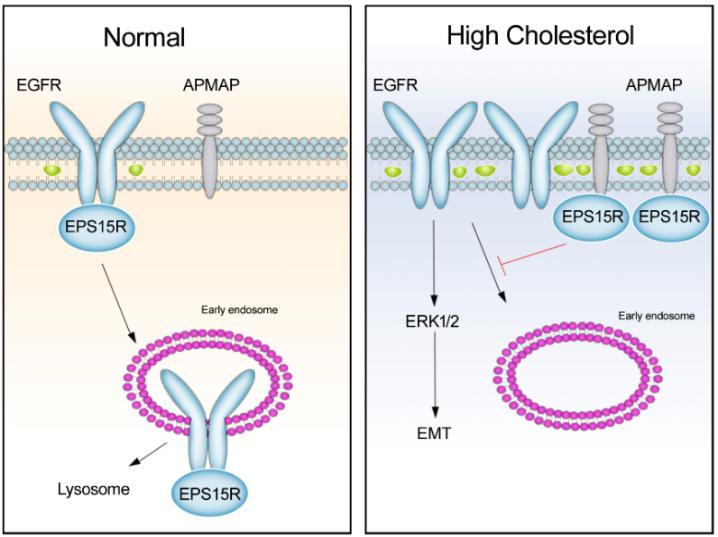The research team led by Prof. GAO Shan from Suzhou Institute of Biomedical Engineering and Technology of Chinese Academy of Sciences, recently reported that adipocyte-associated membrane protein (APMAP) is a potential diagnostic biomarker and therapeutic target for prostate cancer.
Cholesterol is associated with the development of prostate cancer and may serve as a diagnostic biomarker and therapeutic target for prostate cancer. Higher cholesterol promotes tumor growth and reduces the apoptosis of prostate cancer cells. However, the functional role and underlying mechanism of cholesterol on epithelial-to-mesenchymal transition (EMT) remains elusive in prostate cancer.
In this research, scientists found that cholesterol can induce EMT of prostate cancer cells by promoting the accumulation of lipid rafts through regulating the expression of APMAP and epidermal growth factor receptor (EGFR) in lipid rafts. Correspondingly, cholesterol lower drug (statin) is able to inhibit EMT and reverse accumulation of lipid rafts. Furthermore, APMAP regulates cholesterol-induced cell invasion and migration either in vitro or in vivo.
Mechanically, cholesterol inhibits the internalization of EGFR by enhancing the binding of APMAP and epidermal growth factor receptor substrate 15-related protein (EPS15R), which has been shown to mediate endocytosis and degradation of EGFR. Importantly, this process is independent on the androgen receptor signaling.
They also found that APMAP mRNA and protein are up-regulated in various tumors including prostate cancer. Furthermore, APMAP expression level is not associated with castration-resistant status, suggesting that APMAP is a potentially independent diagnostic and therapeutic target for prostate cancer.
These findings may shed light on an APMAP/EPS15R/EGFR axis that mediates cholesterol-induced EMT of prostate cancer cells, potentially providing therapeutic targets and new strategy for the therapy of prostate cancer.
This paper entitled “Cholesterol induces epithelial-to-mesenchymal transition of prostate cancer cells by suppressing degradation of EGFR through APMAP”has been published in Cancer Research.
The above work has been supported by the National Natural Science Foundation of China.

Figure: Proposed model for cholesterol-induced epithelial to mesenchymal transition, by promoting APMAP competitively binding with EPS15R to inhibit EGFR internalization, thus activating ERK1/2. (Image by JIANG Siyuan)
Contact
XIAO Xintong
Suzhou Institute of Biomedical Engineering and Technology, Chinese Academy of Sciences (http://www.sibet.cas.cn/)
Phone: 86-512-69588013
E-mail: xiaoxt@sibet.ac.cn